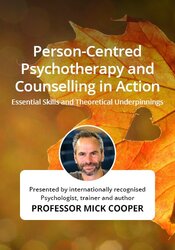

This workshop provides counsellors and psychotherapists – both trainees and in practice – with a contemporary, evidence-informed introduction to Carl Rogers’ person-centred theory and practice. The workshop will introduce participants to Rogers’ theory of development and personality, and his understanding of how psychological difficulties can emerge. From that basis, the workshop will go on to introduce the core tenets of person-centred practice – empathy, unconditional positive regard, and congruence – and demonstrate their application in counselling and psychotherapy work.
The workshop will take a contemporary perspective on person-centred therapy: discussing recent developments in the field, and presenting current research on the approach. Along with input on theory and practice, the workshop will involve self-reflective exercises and videos of practice. This workshop is suited to trainees and practitioners who would like to familiarise themselves with the basics of person-centred therapy, or who would like a refresher on person-centred therapy as it currently stands. The workshop will consist of theoretical input, self-reflection exercises, and whole group exchanges.
This online program is worth 6 hours CPD.
| File type | File name | Number of pages | |
|---|---|---|---|
| Manual - Person-Centred Therapy (4 MB) | 21 Pages | Available after Purchase | |
| Handout - PCEPS-10 (4.8 MB) | 5 Pages | Available after Purchase |

Mick Cooper is an internationally recognised author, trainer, and consultant in the field of humanistic, existential, and pluralistic therapies. He is a chartered psychologist, and professor of counselling psychology at the University of Roehampton. Mick has facilitated workshops and lectures around the world, including New Zealand, Lithuania, and Florida. Mick’s books include Existential Therapies (Sage, 2017), Working at Relational Depth in Counselling and Psychotherapy (Sage, 2018) and The Handbook of Person-Centred Psychotherapy and Counselling (Palgrave, 2013). His latest work is Integrating Counselling and Psychotherapy: Directionality, Synergy, and Social Change (Sage, 2019).
Mick’s principal areas of research have been in shared decision-making/personalizing therapy, and counselling for young people in schools. In 2014, Mick received the Carmi Harari Mid-Career Award from Division 32 of the American Psychological Association. He is a Fellow of the British Association for Counselling and Psychotherapy and the Academy of Social Sciences.
Background to the person-centred approach
Theoretical foundations
Practice foundations
Person-centred practice in action
| 5 |
|
| 4 |
|
| 3 |
|
| 2 |
|
| 1 |
|
Satisfaction Guarantee
Your satisfaction is our goal and our guarantee. Concerns should be addressed to info@pesi.co.uk or call 01235847393.
Please wait ...